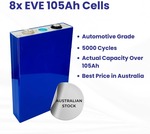8 x EVE LF105 Grade A Cells - 3.2V LiFePO4 105Ah RV Solar Lithium Battery $792 (only $99 per cell)
These automotive-grade cells from EVE are perfect for your next DIY battery project!
EVE is one of the largest and most reputable manufacturers of LiFePO4 cells in the world.
All battery cells we sell come with a guarantee that they will exceed their rated capacity.
They come with quality bus bars, as well as bolts.
Sold in quantities of 8, for larger quantities please contact us for wholesale pricing.


Why is this a bargain ?
Read the posting rules.
https://www.ozbargain.com.au/wiki/help:deal_posting_guidelin…